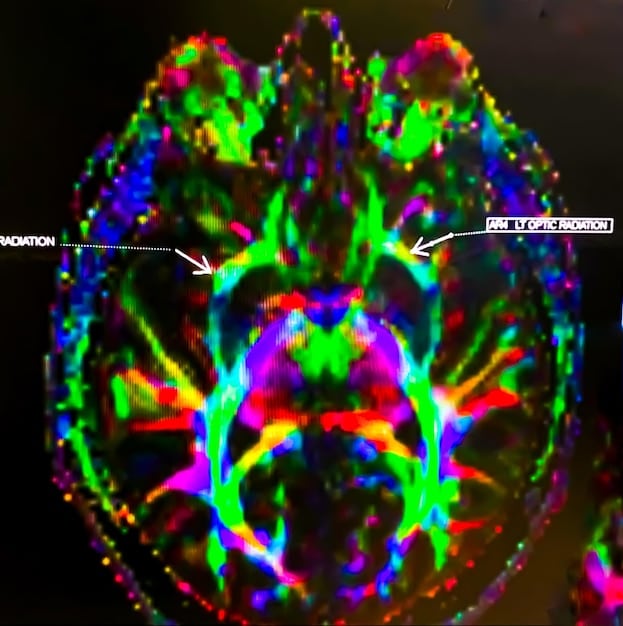Mindfulness Research: Latest Updates & Spiritual Journey Enhancement

Recent mindfulness research highlights enhanced stress reduction, improved emotional regulation, and increased self-awareness, significantly deepening one’s spiritual journey through practices like meditation and mindful living.
Discover what are the latest updates in mindfulness research and how can they enhance your spiritual journey, transforming your approach to everyday life.
Mindfulness Research: A Gateway to Spiritual Growth
Mindfulness, the practice of paying attention to the present moment without judgment, has ancient roots in Buddhist traditions. However, modern science is increasingly validating its profound effects on mental, emotional, and spiritual well-being. This section explores how new research is reshaping our understanding of mindfulness and its potential to catalyze significant personal development.
The Science of Mindfulness Meditation and Brain Function
Scientists are using neuroimaging techniques like fMRI and EEG to study how mindfulness meditation affects the brain. Research consistently shows that regular mindfulness practice can strengthen brain regions associated with attention, emotion regulation, and self-awareness.
One compelling finding is the increase in gray matter density in the hippocampus, a brain area crucial for learning and memory, and the amygdala, which is involved in processing emotions like fear and anxiety. This suggests that mindfulness can enhance cognitive functions and make individuals more resilient to stress.
- Mindfulness meditation strengthens the prefrontal cortex.
- fMRI studies show increased activity during mindful tasks.
- Reduces amygdala reactivity to negative stimuli.
Emerging studies also explore the potential of mindfulness to alleviate symptoms of various mental health conditions such as depression, anxiety, and PTSD. With evidence-based approaches, mindfulness interventions are becoming integral components of therapeutic strategies.
In essence, scientific investigation provides tangible evidence reinforcing the effectiveness and versatility of mindfulness as a powerful tool for transforming the mind and fostering spiritual advancement.

Mindful Living: Integrating Mindfulness Into Daily Life
Mindfulness isn’t just about sitting still in meditation. It’s about cultivating awareness in every aspect of your life. Mindful living means bringing focused attention to everything you do, whether it’s eating, walking, working, or interacting with others. This integration can lead to a profound sense of presence and connection.
By engaging fully with each experience, you can develop enhanced insight, reducing reactivity to life’s challenges and cultivating deeper compassion for yourself and others.
Practical Ways to Cultivate Mindful Living
Incorporating mindfulness into your daily routine is simpler than you might imagine. Start by setting aside a few minutes each day for mindfulness meditation. You can use guided meditations or simply focus on your breath. Then, try bringing that awareness into your other activities.
Pay attention to the sensations of eating, savoring each bite. When walking, notice the feeling of your feet on the ground and the movement of your body. During conversations, listen attentively without interrupting or formulating your response.
- Practice mindful breathing throughout the day.
- Engage in mindful eating, savoring each bite.
- Cultivate non-judgmental awareness of thoughts and feelings.
As you integrate these practices, you’ll likely notice shifts in your perception, emotional regulation, and relationships. The ability to be fully present can bring newfound joy and ease, transforming ordinary moments into extraordinary experiences.
Ultimately, mindful living encourages you to approach life with openness, curiosity, and acceptance, enriching your spiritual journey with authentic presence.
Mindfulness and Emotional Intelligence: New Developments
Emotional intelligence (EI) is the capacity to understand, manage, and express emotions effectively. Research now suggests a strong link between mindfulness and EI. By increasing self-awareness and emotional regulation, mindfulness can significantly enhance your emotional intelligence.
This connection underscores the potential of integrating mindfulness practices to improve communication, build stronger relationships, and navigate complex emotions more effectively.
Understanding the Link Between Mindfulness and Emotional Intelligence
Mindfulness strengthens self-awareness, a core component of EI. Through mindful observation of your thoughts, feelings, and sensations, you become more aware of your emotional landscape. This insight enables you to manage your emotions rather than being controlled by them.
Mindfulness also fosters empathy and compassion, essential aspects of EI. As you cultivate non-judgmental awareness, you become more attuned to the experiences of others, strengthening connections and relationships.
Furthermore, mindfulness enhances the ability to remain calm under pressure, a critical skill for navigating high-stress situations. By staying grounded in the present moment, you can respond thoughtfully rather than reactively.
In light of these developments, mindfulness programs are increasingly incorporated into leadership training and team-building activities. With its profound effects on emotional resilience and interpersonal dynamics, mindfulness facilitates more harmonious and productive environments.
In conclusion, mindfulness not only enhances awareness but also empowers individuals to navigate their emotional landscape with greater skill and empathy, thus enriching their spiritual evolution.

Mindfulness and Stress Reduction: Modern Strategies
In today’s fast-paced world, stress has become a ubiquitous challenge. Fortunately, mindfulness research has identified several effective strategies for stress reduction. By practicing mindfulness, individuals can learn to manage stress more effectively, promoting overall well-being and spiritual growth.
Mindfulness techniques not only mitigate the body’s stress response but also foster a sense of inner calm and resilience, thereby enhancing one’s ability to cope with life’s demands.
Effective Mindfulness Techniques for Stress Relief
One powerful technique is mindfulness-based stress reduction (MBSR), a structured program designed to teach mindfulness skills for coping with stress, pain, and illness. MBSR involves a combination of meditation, body scan exercises, and mindful movement.
Another strategy involves cultivating a mindful approach to daily stressors. Instead of reacting automatically, pause and observe your thoughts and feelings. This pause provides an opportunity to respond thoughtfully rather than impulsively.
- Practice deep breathing exercises to calm the nervous system.
- Engage in progressive muscle relaxation for tension release.
- Use guided imagery to visualize peaceful scenes and sensations.
Emerging research also explores the potential of digital mindfulness apps for managing stress. With guided meditations and daily reminders, these tools make mindfulness accessible and convenient.
Ultimately, these cutting-edge approaches empower individuals to take charge of their well-being, fostering both physical and spiritual resilience.
Spiritual Growth: Integrating Mindfulness for Deeper Self-Awareness
Mindfulness serves as a powerful catalyst for spiritual growth. By increasing self-awareness and fostering a deeper connection with the present moment, mindfulness helps individuals uncover their inner wisdom and cultivate a more meaningful existence.
This section delves into how the principles of mindfulness can be applied to foster spiritual development, leading to greater self-understanding and fulfillment.
Using Mindfulness as a Spiritual Practice
Mindfulness enhances self-awareness by enabling you to observe your thoughts, feelings, and sensations without judgment. This non-reactive awareness allows you to identify patterns and beliefs that may be limiting your spiritual growth.
Mindfulness also deepens your connection with the present moment, fostering a sense of gratitude and appreciation for life’s simple joys. By fully immersing yourself in the now, you transcend past regrets and future anxieties.
- Cultivate compassion for yourself and others.
- Practice loving-kindness meditation to expand your sense of connection.
- Reflect on your values and align your actions with your deepest aspirations.
In essence, integrating mindfulness into your spiritual practice unlocks a path to expanded awareness, inner peace, and authentic self-expression.
Additionally, studies now reveal that mindfulness practices can amplify one’s connection to something greater than oneself, enhancing feelings of unity and purpose. Through this lens, the spiritual journey becomes more grounded and immediate.
Ultimately, mindfulness becomes a tool for understanding not just the self, but the interconnectedness of all things, thereby enriching one’s spiritual trajectory.
Advanced Mindfulness Techniques: Expanding Your Practice
For those who have established a solid foundation in mindfulness, advanced techniques offer ways to deepen their practice and explore new dimensions of awareness. These strategies provide advanced approaches to refining focus, cultivating insight, and achieving profound inner transformation.
Such advanced methods extend beyond basic meditation to incorporate practices that hone the mind, deepen introspection, and foster an ongoing sense of spiritual connectivity.
Exploring Advanced Mindfulness Strategies
Insight meditation, also known as Vipassana, is an advanced practice that involves observing the changing nature of your thoughts, feelings, and sensations. Through this sustained observation, you gain deeper insights into the nature of reality and the impermanence of all things.
Another technique is walking meditation, which combines mindfulness with physical movement. As you walk slowly and deliberately, you maintain awareness of the sensations in your body and the environment around you.
- Engage in retreats for intensive mindfulness practice.
- Study ancient texts and teachings on mindfulness.
- Seek guidance from experienced mindfulness teachers.
Also, focused attention (Samatha-Vipassana) combines concentration with open monitoring to enhance cognitive control and emotional regulation. In this approach, practitioners first stabilize their mind through focused attention before cultivating greater insight through open monitoring.
By embracing these advanced practices with dedication and wisdom, you can elevate your mindfulness skills to new levels, facilitating profound spiritual insights and self-realization.
| Key Point | Brief Description |
|---|---|
| 🧠 Brain Function | Mindfulness improves brain areas related to attention and emotion. |
| 🧘 Mindful Living | Integrating awareness into daily activities enhances presence. |
| ❤️ Emotional Intelligence | Mindfulness boosts self-awareness and empathy. |
| 🧘♂️ Stress Reduction | Techniques like MBSR reduce stress and enhance coping abilities. |
FAQ Section
▼
Mindfulness means paying attention to the present moment without judgment. Core principles include acceptance, patience, and non-reactivity.
▼
Mindfulness improves self-awareness, enabling better emotion management and stronger interpersonal relationships through enhanced empathy.
▼
Techniques involve practicing deep breathing, engaging in mindful movement, and using guided imagery exercises to lower stress levels effectively.
▼
Incorporating mindfulness involves bringing conscious attention to routine activities like eating, walking, and communicating to enhance present moment awareness.
▼
Advanced approaches include insight and walking meditation, intensive retreats, and studying ancient teachings to profoundly deepen self-awareness and spiritual insights.
Conclusion
In conclusion, the latest updates in mindfulness research provide a wealth of insight into its benefits for mental, emotional, and spiritual well-being. By integrating mindfulness into daily life, individuals can enhance their capacity for self-awareness, emotional intelligence, and stress reduction, unlocking new levels of spiritual growth and creating a more purposeful and fulfilling life journey.





